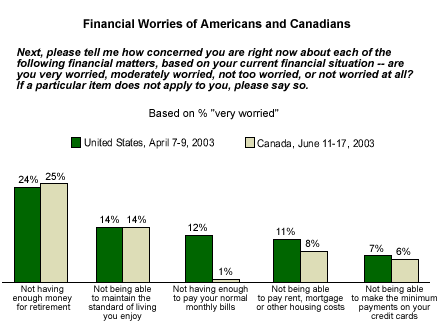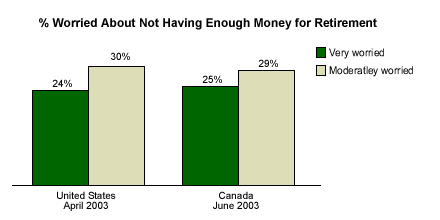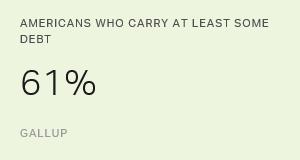In two polls conducted this spring*, Gallup asked Americans and Canadians to rate a list of possible financial concerns on a scale ranging from "very worried" to "not worried at all." As it turns out, providing for their own retirement is weighing most heavily on the minds of adults in both countries -- overshadowing concerns about credit card debt, mortgage payments, and the cost of living. About one in four residents of each country -- 24% of Americans and 25% of Canadians -- say they are very worried about not having enough money for retirement.

Aging in America
In America, these worries are looking increasingly credible as the first of the 76 million baby boomers (currently those aged 39 to 57) become eligible for Social Security benefits in 2008.
Faced with spiraling healthcare costs, American firms are cutting back on health insurance benefits for future retirees. In a 2002 study of private corporations by the Kaiser Family Foundation, firms reported an average 16% increase between 2001 and 2002 in the cost of providing healthcare to retirees. In the same study, 82% of all employers said they planned to increase premiums for retirees over the next three years, while 22% intend to stop extending health benefits to retirees altogether.
Even as healthcare costs rise and coverage is limited, the oldest baby boomers in America have a median net worth of just $146,000 to see them through retirement, according to AARP. And while 401(k) investments have been ravaged by exposure to single stocks and a bear market, retirees cannot rely on savings to generate income either in the current low interest rate environment.
In a disturbing trend, analysts have found that despite the small absolute number of bankruptcies among older Americans, they have the fastest growing bankruptcy rate of any demographic segment. Boomers have more debt per capita than the national average, and the Consumer Bankruptcy Project found that 450,000 persons over age 50 filed for bankruptcy in 2002, up 150% from 180,000 in 1991. The Federal Reserve Board has highlighted 55- to-64-year-olds as an age group that has run up large amounts of debt, thanks to reverse mortgages and credit card bills.
In Canada Boomers Opt to Work
By 2030, the worker-to-retiree ratio in Canada will fall precipitously to 3:1 as the peak phase of boomer retirement sets in. Nearly 20% of Canadian boomers will have retired by 2011, and the aftermath of this retirement will be felt in the jobs they leave empty -- Canada already faces a severe shortage of nurses, for example. Such shortages, together with shrinking nest eggs and increasing life expectancies, may force aging boomers to stay in the workforce longer rather than opting for early retirement. And with public benefits to the elderly as a percentage of GDP at 8.9% in 2000 in Canada, the outlook does not look much better.
While investments in equities have provided aggressive returns to boomers in the past, the increasingly deflationary environment and interest rate cuts will take a toll on investments. By 1999 estimates, Canadians in the 55-to-64 age group had a median net worth of just over $154,000; to retire comfortably, financial planners estimate they would need a net worth of nearly four times that amount. It might be a while before boomers in Canada retire to the fairways.
American Deficit Disconnect
As the current economic recovery in America remains tentative, the need to stimulate the economy is overwhelming -- running deficits at the risk of crowding out private investment remains the order of the day. However, a high and long-term fiscal deficit will put pressure on the retirement benefits available to Americans through Medicare and Social Security, or in the worst case could result in cutbacks on these benefits. In a July Gallup Poll, only 3% of Americans mentioned the federal budget deficit as the most important problem facing the country, yet with 24% of Americans very worried about not having enough money for retirement, a long-term deficit is a cause for concern.
Bottom Line
At 54%, more than half of all Americans and Canadians are very or somewhat worried about their financial security during retirement. As the cost of healthcare in the two countries increases and both governments prepare themselves for an unprecedented number of retirees to enter the Social Security system, policy-makers need to look ahead of immediate political concerns to make sure their systems will be capable of accommodating their needs.

*Results in the United States are based on telephone interviews with 1,018 national adults, aged 18 and older, conducted April 7-9, 2003. For results based on the total sample of national adults, one can say with 95% confidence that the maximum margin of sampling error is ±3 percentage points.
Results in Canada are based telephone interviews with 1,001 national adults, aged 18 and older, conducted June 11-17, 2003. For results based on the total sample of national adults, one can say with 95% confidence that the maximum margin of sampling error is ±3 percentage points. Results for the Canada may not equal 100% due to rounding error.
In addition to sampling error, question wording and practical difficulties in conducting surveys can introduce error or bias into the findings of public opinion polls.

